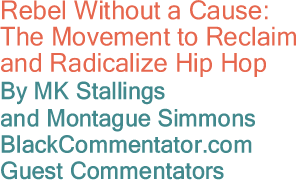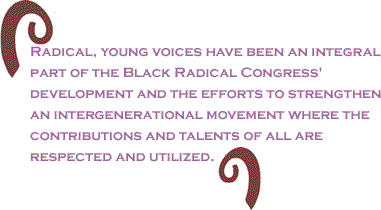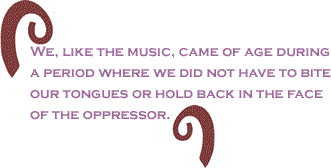
|
||||||||||||||||||||||
 |
||||||||||||||||||||||
 |
||||||||||||||||||||||
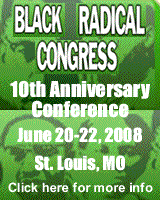 |
||||||||||||||||||||||
 |
||||||||||||||||||||||
 |
||||||||||||||||||||||
 |
||||||||||||||||||||||
 |
| The current issue is always free to everyone |
|
|
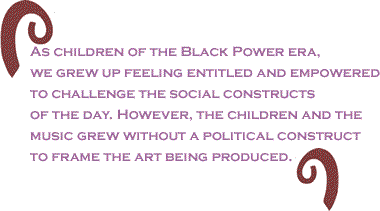 |
Hip Hop, celebrated as the child of the Civil Rights and Black Power eras, was born as an insurgent voice of outrage against the poverty and violence that permeated the Black and Latino communities of Bronx, New York in the early 1970s. The music and culture reflected the psychosocial and political realities of the day. Like the Harlem Renaissance, Freedom songs and Black Artist Movement before it, hip hop was born of the most oppressed segments of America; but unlike its predecessors, the music was not born of an existing political movement. As children of the Black Power era, we grew up feeling entitled and empowered to challenge the social constructs of the day. However, the children and the music grew without a political construct to frame the art being produced.
We, like the music, came of age during a period where we did not have to bite our tongues or hold back in the face of the oppressor. Initially surviving solely on the underground, Hip Hop, in all of its forms, spread like a virus out of New York, up and down the east coast, throughout the south, Midwest, West Coast and around the world. Kids of all ages and races embraced the art form. But before going global, the market forces of the music industry in the late 1980s transformed the art of Hip Hop into a commercial enterprise.
The commercial appeal of Hip Hop and its expansion in the marketplace reflected the self-interest taking over the art. By the early 1990s, artists like Dr. Dre, who decried the use of marijuana by saying "Brain damage on the mic don't manage," were selling a multi-platinum album bearing the name "The Chronic," after the illicit drug. It was clear that Wu-Tang Clan's anthem Cash-Rules-Everything-Around-Me not only reflected the hardcore realities expressed in "The Message" but also the mood in the music industry. The marketplace has allowed Hip Hop to become its own market niche. Advertisers use Hip Hop to sell everything from deodorant to toys. From network and cable television to corporate radio, Hip Hop is a multi-billion dollar industry. Within the marketplace all of its negatives (guns, violence, misogyny, homophobia, etc.) become commodities sold to the highest bidder; and no market is more faithful and consistent than the Hip Hop Generation. Attempting
to harness the power of Hip Hop's appeal, activists have gotten
involved. There has been ongoing outreach by activist
like The power of the Hip Hop Generation is becoming more evident as the generation continues to mature. In 2004, nonpartisan campaigns such as Puff Daddy's Vote or Die registered hundreds of thousands of new voters for the presidential elections. Recently their organizing power came into full view in Jena, Louisiana where thousands of people converged after being organized for action using online communities like MySpace and Facebook as well as text messaging.
One of the first and most prominent attempts to harness that energy came with the founding Black Radical Congress (BRC) where veteran activists and academics joined with activists of the Hip Hop Generation to form the Freedom Agenda and the platform of the organization. Radical, young voices have been an integral part of the BRC’s s development and the efforts to strengthen an intergenerational movement where the contributions and talents of all are respected and utilized. The discussion of this continued role will be expanded at the 10th Anniversary Black Radical Congress Conference in St. Louis. Troy Nkrumah of NHHPC will join with Rev. Lennox Yearwood of the Hip Hop Summit to conduct a workshop entitled "Radicalizing Hip Hop". Join us the weekend of June 20th - 22nd on the campus of the University of Missouri - St. Louis. For more information visit blackradicalcongress.org or obs-onthemove.org. MK Stallings and Montague Simmons are members of the Organization for Black Struggle and the St. Louis Organizing Committee for The National Hip Hop Political Convention (nhhpc.org) and are on the host committee for the 10th Anniversary Black Radical Congress.Click here to contact Mr. Stallings and Mr. Simmons. |
Your comments are always welcome. e-Mail
re-print notice
If you send us an e-Mail message we may publish all or part of it, unless you tell us it is not for publication. You may also request that we withhold your name. Thank you very much for your readership. |
|
| June
12, 2008 Issue 281 |
|
| Executive Editor: Bill Fletcher, Jr. |
| Managing
Editor: |
| Publisher: Peter Gamble |
| Est. April 5, 2002 |
| Printer Friendly Version in resizeable plain text format or pdf format. |
 |
 |
 |
| |
| |





















